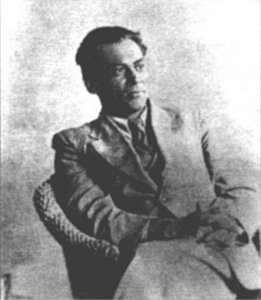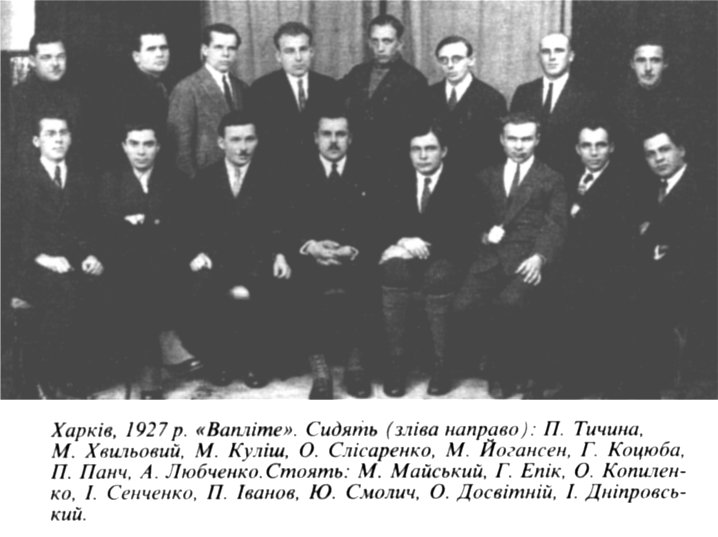

 |
 |
Àðêàä³é Ëþá÷åíêîArkadii Liubchenko1899 - 1945
|  |
Arkadii Liubchenko, born 7 March 1899 in Staryi Zhyvotiv, Uman county, Kiev gubernia; died 25 February 1945 in Bad Kissingen, Germany.
Liubchenko was active in the literary movement of the 1920s and 1930s, as secretary of the literary association Hart, co-founder and permanent secretary of Vaplite, and co-founder of Prolitfront and the almanac Literaturnyi iarmarok. He edited the State Publishing House of Ukraine editions of V. Vynnychenko's selected works (1927) and V. Stefanyk's selected works (1928). He also worked in the editorial office of the newspaper Vil'na Ukraina in Kharkiv (1941-2). He began to publish his work in 1918, including the neoromantic-impressionist collections of stories and novels Buremna put' (The Tempestuous Road, 1927), Vona (She, 1929), and Vitryla tryvoh (The Sails of Anxieties, 1932), as well as articles, essays, and translations of the French authors A. Daudet and F. Mauriac. His Shchodennyk (Diary) was published posthumously.

A photograph of the members of VAPLITE in 1927, in Kharkiv. Seated, left to right:
Pavlo Tychyna, Mykola Khvyl'ovyi, Mykola Kulish, Oleksa Slisarenko, Maik Iohansen, Hryhorii Kotsiuba, Petro Panch, Arkadii Liubchenko.
Standing, left to right: Mykhailo Mais'kyi, Hryhorii Epik, Oleksander Kopylenko, Ivan Senchenko, P. Ivanov, Iurii Smolych, Oles' Dosvitnii, Ivan Dniprovs'kyi.
Vaplite (= Vil'na akademiia proletarskoi literatury [Free Academy of proletarian Literature]) was a writer's organization which existed in Kharkiv from 1925 to 1928. While accepting the official requirements of the Communist Party, Vaplite adopted an independent position on questions of literary policy and supported M. Khvylovyi in the Literary Discussion of 1925-8. Vaplite proposed to create a new Ukrainian literature based on the writers in its ranks who strived to perfect their work by assimilating the finest masterpieces of Western European culture. Stalin interpreted that goal as a betrayal of the aims of the Party and accused Khvylovyi and Vaplite of working under the slogan "Away from Moscow." The association rejected decisively the policy of mass participation (masovism) in proletarian writers' organizations, which were supported by the Communist Party. Khvylovyi was the actual leader of Vaplite; its official president was first M. Ialovyi (Iu. Shpol) and then M. Kulish, and its secretary was A. Liubchenko. Its members were M. Bazhan, V. Vrazhlyvyi, I. Dniprovskyi, O. Dosvitnii, H. Epik, P. Ivanov, M. Iohansen, O. Kopylenko, H. Kotsiuba, M. Maiskyi, P. Panch, I. Senchenko, O. Slisarenko, Iu. Smolych, P. Tychyna, and Iu. Ianovskyi. The association published the almanac Vaplite (1926), devoted mostly to literary problems, and five issues of the journal Vaplite (1927). Vaplite's position on literary issues was supported by the Neoclassicists (M. Zerov in particular) and by other Ukrainian writers.
The ideas of Khvylovyi and Vaplite came under vehement criticism not only from their literary rivals and key Soviet leaders of Ukraine (e.g. V. Chubar, V. Zatonskyi, M. Skrypnyk, T. Taran, and A. Khvylia) but also from the Communist Party of Ukraine. Neither the admission of political "erors" by Khvylovyi and others in December 1926 nor the expulsion of Khvylovyi, Ialovyi, and Dosvitnii from Vaplite in January 1927 could save the organization. Khvylovyi's novel Val'dshnepy (The Woodcocks, first part published in Vaplite, no. 5, 1927) came under particularly severe criticism. The sixth and last issue of Vaplite, containing the continuation of the novel, was confiscated at the printing office and Vaplite was forced to dissolve. Members of the association continued their literary work in association with the journal Literaturnyi iarmarok and in the organization Prolitfront.
The periodical Vaplite was the official organ of the group. Its editiorial board consisted of M. Kulish, I. Senchenko, O. Slisarenko, P. Tychyna, and M. Iohansen. Only an almanac and five issues of the periodical appeared. The almanac (1926) consisted of articles on cultural politics and literary topics submitted by five members of Vaplite and the Comintern figure V. Serge (Kibalchich), Vaplite's statute, and a literary chronicle. The periodical issues (1927) contained poems and prose by Vaplite members and other writers (e.g. N. Surovtsova, V. Stefanyk, N. Shcherbyna, K. Hordiienko, D. Falkivskyi, H. Koliada); polemical and theoretical articles and literary criticism (including articles by non-members, such as I. Aizenshtok, E. Kruk, R. Iakobson, A. Pavliuk, L. Kurbas, I. Vrona, H. Maifet, and V. Derzhavyn); an article on literary Paris by the Russian writer A. Gatov; literary translations by A. Liubchenko, P. Tychyna, V. Pidmohylnyi, and A. Pavliuk; a literary chroncile (probably by A. Leites; book reviews; and Vaplite's resolutions (1927, no. 2). The periodical and its contributors were constsmtly attacked by party critics belonging to the All-Ukrainian Association of Proletarian Writers and Molodniak, particularly by V. Koriak. The Party forced Vaplite to cease publication after it printed former Vaplite member M. Khvylovyi's novel Val'dshnepy (The Woodcocks, part 1) and a literary article by the non-member P. Khrystiuk. The sixth issue of Vaplite, containing the continuation of Khvylovyi's novel, was confiscated by the authorities at the printing ofice.(1)
1